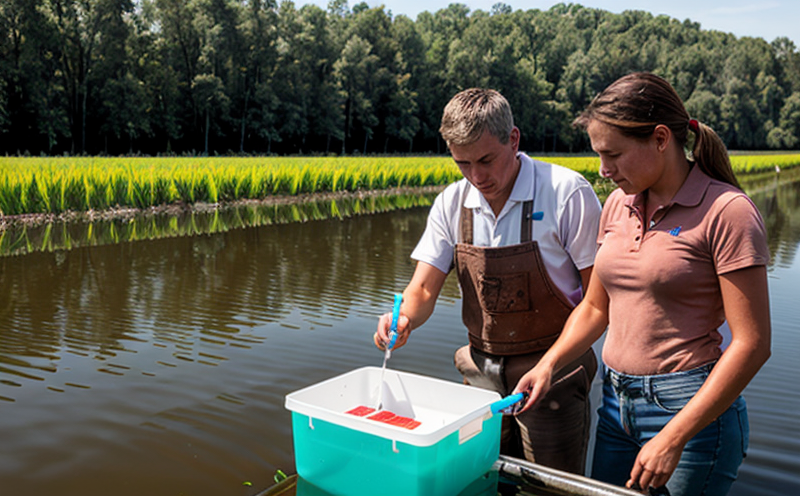Cyanobacteria (Blue-Green Algae) Testing in Agricultural Water
The presence of cyanobacteria or blue-green algae in agricultural water is a critical issue that can significantly impact crop health and water quality. These organisms thrive under specific environmental conditions, often proliferating during periods of warm weather, high nutrient levels, and stagnant water conditions. Cyanobacteria can produce harmful toxins such as microcystins, which are potent hepatotoxins capable of causing severe health issues in both humans and livestock when consumed.
Testing for cyanobacteria is essential to ensure that water used in agricultural practices meets safety standards and regulatory requirements. This testing not only helps protect the environment but also ensures compliance with international standards such as ISO 13286, which provides guidelines for the enumeration of blue-green algae in drinking water supplies.
Our testing process involves several key steps to ensure accurate results. First, water samples are collected from various points within the agricultural water system. These samples must be carefully handled and preserved to maintain the integrity of the cyanobacteria present. Next, laboratory analysis is conducted using advanced microbiological techniques and spectrophotometric methods to quantify the presence of these organisms.
The results of our testing provide actionable data for farmers and agricultural professionals, helping them make informed decisions about water management practices. By identifying the presence of cyanobacteria early on, stakeholders can implement mitigation strategies such as improving water circulation or adjusting nutrient levels in the system.
Our comprehensive testing service also includes a detailed report that outlines the findings, including the specific types and concentrations of cyanobacteria detected. This information is invaluable for quality managers and compliance officers looking to maintain high standards within their operations. Additionally, our R&D engineers can use this data to refine agricultural practices and improve overall water management techniques.
In summary, testing for cyanobacteria in agricultural water systems is crucial for maintaining safe and sustainable agricultural practices. By partnering with us, stakeholders gain access to reliable and accurate test results that inform critical decisions related to water quality and compliance.
Benefits
Testing for cyanobacteria in agricultural water offers numerous benefits that are essential for maintaining both environmental health and operational efficiency. Firstly, it allows for early detection of potential risks associated with cyanotoxins, which can help prevent outbreaks of diseases such as liver failure or neurological disorders.
Secondly, this testing supports regulatory compliance by ensuring adherence to stringent water quality standards set forth by international organizations like the World Health Organization (WHO) and local governments. Compliance is crucial for avoiding costly fines and reputational damage associated with non-compliance.
Thirdly, regular cyanobacteria testing enables proactive management of water resources, allowing stakeholders to identify and address issues before they escalate into larger problems. This approach fosters a more sustainable approach to agriculture by promoting long-term solutions rather than reactive fixes.
In addition, the data provided by our testing can be used to optimize irrigation practices, leading to improved crop yields and reduced water usage. This not only benefits farmers financially but also contributes positively to environmental conservation efforts.
Finally, transparent communication regarding cyanobacteria levels fosters trust among stakeholders including customers, suppliers, and community members. It demonstrates a commitment to responsible stewardship of resources and sets the organization apart as an industry leader in sustainable practices.
Industry Applications
| Application | Description |
|---|---|
| Farm Water Management | Identifies cyanobacteria levels to inform decisions about water treatment and irrigation practices. |
| Pasture and Livestock Welfare | Evaluates risks of toxin exposure for grazing animals, ensuring their health and well-being. |
| Fruit and Vegetable Production | Monitors water quality to prevent contamination that could affect product safety and marketability. |
| Dairy Farming | Aids in maintaining clean drinking water sources for dairy cows, promoting better milk quality and animal health. |
| Horticulture | Assists in optimizing greenhouse irrigation systems by providing insights into water cleanliness. |
| Application | Description |
|---|---|
| Pest Control and Management | Detects cyanobacteria to assess the effectiveness of control measures in preventing further proliferation. |
| Ecosystem Health Monitoring | Tracks changes in water quality over time, contributing to broader ecological studies and conservation efforts. |
| Crop Rotation Planning | Provides data on cyanobacteria presence that can influence decisions about crop types and rotations. |
| Sustainable Agriculture Practices | Encourages the adoption of eco-friendly practices by highlighting water quality issues early in the process. |
Why Choose This Test
Selecting our cyanobacteria testing service ensures that stakeholders receive accurate, reliable, and actionable data tailored specifically to their unique needs. Our team of experts uses cutting-edge technology and methodologies to ensure precision in every step of the process—from sample collection to final analysis.
Moreover, we offer customized testing packages designed to cater to different scales of agricultural operations, whether it's small-scale farms or large commercial enterprises. This flexibility allows us to provide targeted solutions that align perfectly with each client’s goals and objectives.
Our commitment to excellence extends beyond just providing top-tier technical expertise; we also prioritize customer satisfaction by offering clear communication channels and timely delivery of reports. By choosing our service, clients gain confidence knowing they are partnering with a trusted leader in agricultural testing.





